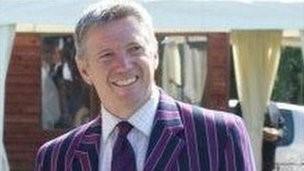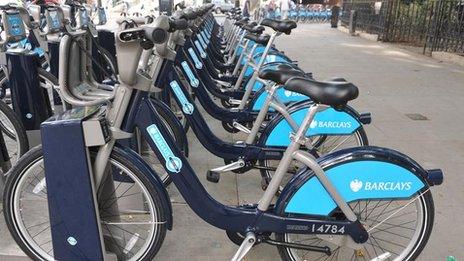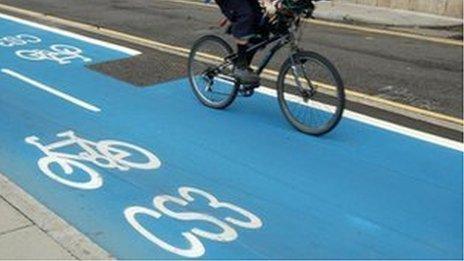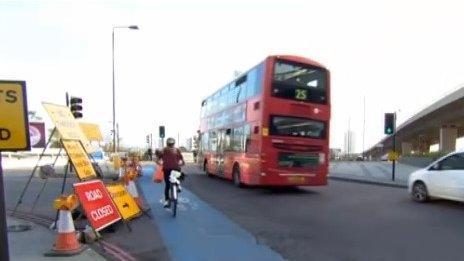Cycle death families' endurance in quest for truth
- Published
- comments

Brian Dorling had been cycling to work at the Olympic Park when he was killed
This week I've sat through two days of inquests into cyclists who died on the Cycle Superhighway 2 (CS2) in east London.
The coroner was extremely thorough and when she files a report into both of these cases there may be more criticisms of CS2. The route currently runs from Bow to Aldgate.
French student Philippine De Gerin-Ricard, 20, was killed on the route in Aldgate in July, and Brian Dorling died in October 2011 at Bow roundabout on one of the painted blue cycle lanes. Both had been hit by lorries.
Here are some thoughts on what I saw sitting in Poplar Coroner's Court. I thought it was important more people shared what all those involved had to go through.
The most striking thing is how families of those who died find the whole experience very upsetting but endure it in order to get to the truth.
In the case of Philippine De Gerin-Ricard, her mother asked to see her daughter's moment of death on CCTV for a second time.
Both of the families showed great dignity and composure in horrendous circumstances. They're trying as best as they can to deal with very public grief.
The other point I noted is the Met officers involved are clearly frustrated they outlined huge concerns about Aldgate and Bow roundabout which were effectively ignored.
It seemed to me they also had witnessed too many of these incidents and this was their own tipping point. They wanted their many concerns on the record.
Cycle superhighway
Transport for London (TfL) itself is - perhaps not surprisingly in these circumstances - extremely defensive.
'21 concerns'
As an organisation it was under intense scrutiny, the main point being why are cyclists encouraged to use junctions on the cycle superhighway that TfL has been warned are dangerous.
At Aldgate, where Miss De Gerin-Ricard died, the Met raised 21 concerns.
That question still hangs over TfL and the mayor although, in fairness, they are now improving both of these junctions.
Finally the HGV drivers involved in both deaths are themselves clearly devastated by what has happened.
In both cycling deaths the coroner heard it was implied the two drivers had stopped doing HGV work since the collisions.
In court they both looked visibly upset and it seemed were living with the terrible consequences of what happened.
In each case the families of those who died seemed to try to forgive the drivers.
Miss De Gerin-Ricard's father, on his way out of court, shook the driver's hand and looked him in the eye. Her mother hugged him.
Debbie Dorling, Brian Dorling's widow, has previously shown similar forgiveness.
Debbie Dorling said it was only after her husband's death that the junction was changed.
There are no positives in these deaths and it is hard not to reflect on the senselessness.
In both cases HGV blind spots played a part and it is hard to see how vehicles that have such glaring endemic safety flaws are allowed in busy streets.
The driver in the case of Miss De Gerin-Ricard had 3.7 seconds to spot her in one small mirror.
The stakes are too high to be relying on a driver looking at one small mirror for 3.7 seconds. Serious legislated redesign of HGVs has to be a political priority.
Practically, if you are a cyclist I would seriously consider looking at just how large these blind spots are. Consider hanging back from HGVs.
And what it also makes clear is cyclists and HGVs should, wherever possible, be kept apart particularly on busy dangerous junctions. Otherwise it's hard not to see the same thing happening again.
- Published16 October 2013

- Published15 October 2013

- Published15 October 2013

- Published6 July 2013
- Published12 November 2011